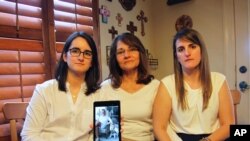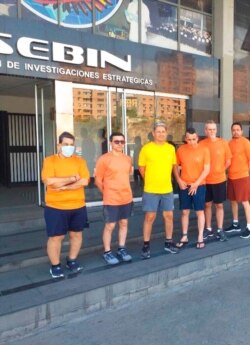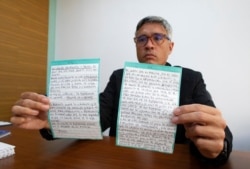A U.S. oil executive jailed for three years in Venezuela said all he hopes for is a fair trial so that he can walk free with his name cleared and go home to his family in the United States.
In a letter from prison provided exclusively to The Associated Press, Tomeu Vadell said it's especially painful to be separated during the Thanksgiving season from his wife, three adult children and a newborn grandson he's never held.
"Before living this tragedy, these celebrations were very special times for our family," Vadell wrote, saying he embraced the traditional American holiday after moving in 1999 from Caracas to Lake Charles, Louisiana, for a job with Venezuelan-owned Citgo. "Now, they bring me a lot of sadness."
It's the first time Vadell or any of the other so-called Citgo 6 have spoken publicly since being arrested and charged with a massive corruption scheme. He's held at a feared Caracas jail called El Helicoide.
Despite his circumstances, Vadell held out hope for a brighter future.
"During the trial, the truth has proven undeniable," Vadell said in the four-page handwritten letter. "It proves that I am innocent."
2017 meeting
Vadell, 61, and the five other Citgo executives were summoned to the headquarters of the Venezuelan state-run oil firm PDVSA, the parent company of the Houston-based Citgo, for what they had been told was a budget meeting on November 21, 2017. A corporate jet shuttled them to Caracas, and they were told they'd be home for Thanksgiving.
Instead, a cadre of military intelligence officers swarmed the boardroom, taking them to jail.
Their trial started four months ago and closing arguments took place Thursday. That began a wait for the judge's verdict.
With their arrests, President Nicolás Maduro's government launched a purge inside Venezuela's once-thriving oil industry, built on the world's largest crude reserves. It later arrested the head of PDVSA, a former oil minister and dozens of others.
The men accused along with Vadell are Gustavo Cárdenas, Jorge Toledo, brothers Jose Luis Zambrano and Alirio Zambrano, all now U.S. citizens, and Jose Pereira, a permanent resident.
They're charged with embezzlement stemming from a never-executed proposal to refinance $4 billion in Citgo bonds by offering a 50% stake in the company as collateral. Maduro at the time accused them of "treason." They all have said they are not guilty.
The trial has played out one day a week in a downtown Caracas court. Because of the pandemic, sessions are held in front of a bank of dormant elevators in a hallway, apparently to take advantage of air flowing through open windows.
Reporters and rights groups have been denied access to the hearings. There was no response to a letter addressed to Judge Lorena Cornielles seeking permission for The Associated Press to observe.
The office of Venezuela's chief prosecutor said in a statement to the AP that investigators found "serious evidence" that corroborates financial crimes potentially damaging to the state-run company.
"The Citgo case has developed normally during all the stages established by the Venezuelan criminal process," the statement said. "In the next few days, we'll know the verdict."
Held for 'all the wrong reasons'
Vadell's attorney, Jesus Loreto, said his client appears to have been caught up in a "geopolitical conflict" of which he's not a part. He said Vadell's name never appeared on any of the documents prosecutors read into evidence.
"There's nothing that refers to Tomeu in any way — directly or indirectly," he said. "This is the story of a good guy being held against his will for all the wrong reasons."
Former New Mexico Governor Bill Richardson, who has negotiated the release of other Americans held by hostile governments, traveled to Caracas in July and met with Maduro.
He didn't win their freedom, but days later two of them — Cárdenas and Toledo — were freed from jail and put in house detention. Two weeks later, the long-delayed trial began.
Richardson told The Associated Press that conversations with the Venezuelan government continue, despite his meeting with Maduro being "a little stormy."
Richardson said he believes there's an opening tied to President-elect Joe Biden's election and a desire by Maduro to improve relations with Washington.
"I think the Venezuelans have been straight with me, but more progress needs to be made," he said. "My hope is to have something positive by Christmas."
It's not clear what approach Biden will take toward Maduro. Trump aggressively pressed to remove Maduro through sweeping financial sanctions, and the U.S. Justice Department has indicted Maduro as a "narcoterrorist," offering a $15 million reward for his arrest.
Vadell's letter steered clear of politics. He didn't mention Maduro or speak about his jailers, though he did express concern about the "consequences" of speaking out.
With encouragement from his family, Vadell broke his silence, taking a risk relatives said was necessary.
'Light of hope illuminates us'
"I believe it's more important that the light of hope illuminates us," Vadell wrote. "May the light of hope put an end to the sadness of my family."
The five other men did not respond to invitations The Associated Press made through their lawyers to comment.
Vadell's daughter, Cristina Vadell, 29, said in a phone interview from Lake Charles that her father isn't the kind of person who seeks attention. Rather, he prefers to focus on work and his family.
During his 35-year career with PDVSA and Citgo, Vadell ended up running a massive refinery in Lake Charles and then became vice president of refining. The letter attempts to expose this side of his life, she said.
"I think he was willing to take some risks and open some hearts to allow him to come home," she said. "I think he's still wondering, 'What happened?' He went to a work meeting and never came home."
She shared photos of the family with her father, standing around a Thanksgiving turkey. Each year, they would give it a name, something like Charlie or Phillip. The past three Thanksgivings just haven't been the same without him, she said.
Vadell wrote that he's proud to be the son of Spanish immigrants to Venezuela, where he was educated as an engineer. He brought his family to the U.S., bringing the best of the two countries together, he said.
"I'm now reaching an intersection where if justice is done, I will be able to rebuild my life and try to compensate my family for all the lost moments," Vadell wrote. "The light is intense — the hope is great — give me freedom."






